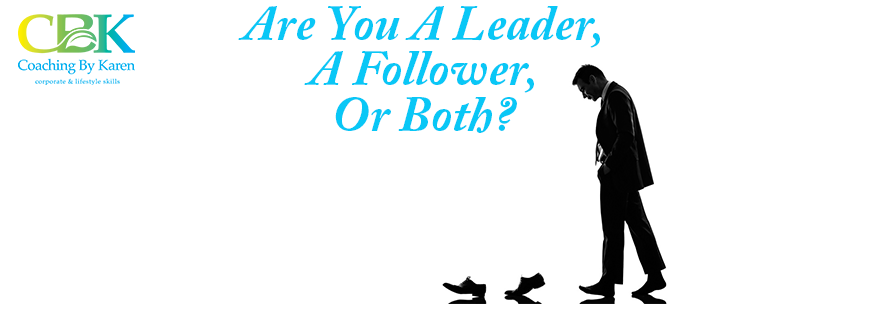Are You A Leader, A Follower, or Both?

What is a leader?
This seems a simple question, and it is, really. But the answer is not so simple. One very basic definition of the word is that it’s a person who leads or commands a group, organization or country. That definition, however, relates purely to the notion of leader as a job description, rather than as a person who possesses the abilities necessary to lead others. So when I write about a leader, I am not referring to the office or job of someone who has been put in charge. I’m talking about someone with specific skills who proactively leads, and often inspires, those who follow him or her.
The qualities of a good leader can be boiled down to three very important ones; courage, vision and high emotional intelligence (EQ or EI). Courage is about doing the right thing in the face of fear. It means we do what scares us because it is necessary for the greater good or, sometimes, just for an individual. In big and small ways, leaders must exercise and demonstrate courage consistently in order to achieve goals and positively influence the people around them. Winston Churchill has been the author of more than one quote on the subject of courage, but the one I like to use with some of my clients in leadership positions is “Courage is what it takes to stand up and speak; courage is also what it takes to sit down and listen.” A good leader must able to do both.
The four rules of leadership that I share with my clients are:
- Let go of your ego
- Become a good follower
- Build positive relationships
- Always work toward excellence
Letting go of your ego is very difficult for most of us. And people who are viewed as leaders often start out with a very healthy ego, which smart leaders know they need to curb. Letting ego have too much influence on one’s thoughts and actions can be deadly in a leader. They don’t hear what others say. They don’t see themselves as others see them. They don’t have the emotional intelligence required to get the best from others. Worse, their egos may cause others to be less participatory in team activities and, therefore, less productive. A smart leader recognizes that there is little room for over-sized egos when a team has an objective or mission that must be executed productively and by everyone. That leader will, by example, work and direct others to work in a way that allows everyone involved to focus on achieving the group objective. That leader will also let the team take the credit for a job well done.
Becoming a good follower means that a good leader knows when to step back and let his or her people take the lead on a certain assignment or an entire project. The idea is that a good leader demonstrates trust by providing just enough guidance to get people moving in the right direction. If that leader has done a good job of preparing and encouraging the team, the team will generally rise to the occasion and will not be fearful if they need to ask for further information or guidance. The leader can then participate as part of the team, with everyone free to contribute, or participate as a subject matter expert to be consulted with as needed. When a leader shows complete faith in the team or individual and is willing to follow someone else from time to time, it gives the team the confidence required and their goal will be to exceed expectations.
Building positive relationships will go a very long way in assuring the continued success of a leader, and understanding the value of emotional intelligence will provide a tremendous advantage in building and maintaining these relationships. EI, as my regular readers know, is the ability to sense, understand, and effectively apply the power and acumen of emotions to facilitate high levels of collaboration and productivity. Emotional intelligence is awareness of your own emotions and those of others. Great leaders are very high in EI, but all of them may not have started out that way. EI is something that can be improved upon, as long as one is self-aware enough to determine that improvement is needed.
Always work toward excellence! When an emotionally intelligent leader is always working toward excellence through his or her thoughts, words and actions, the team will follow that example. The team is watching the leader and when the leader does this consistently, success will follow!

